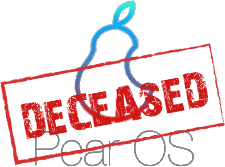2022 update: PearOS “NiceC0re” was released.
I can’t tell if it’s the same people involved, I can’t see much in the way of anything except an Instagram feed pumping out pretty pictures. Be careful what you install. It might be pretty, but day to day security is important.

“The software centre doesn’t work!”, “I can’t install packages!”, “apt-get gives me 404 errors”.
This happens because Pear OS 8 (the last version) was based on Ubuntu 13.04 and the support cycle for 13.04 ended in January 2014. Shortly after support ended, the repositories were locked and archived. That’s what breaks everything. Apt doesn’t know where to look.
Some might argue you can work around this but the only viable strategy is to install another OS. An upgrade to 13.10 (also dead) and then 14.04 (supported until 2019) might be an option but I can’t speak for the Pear-specific packages and configuration which have been unsupported for just as long as Ubuntu 13.04. It’s cleaner and faster to start again. Get your data safe and install Ubuntu 14.04 and customise how it looks.
Software has an expiry date.
We all like to think Ubuntu and Linux are great and invulnerable but it all counts for naught if you’re running software from 2013. Seriously though, Pear 8 ships Firefox 25.0 which by now has just 60 vulnerabilities. And that’s just one application. There are 172 published vulnerabilities for Pear 8’s kernel. Hackers can penetrate Pear 8 with absurd ease.
I could go on but simply put: Friends don’t let friends use Pear OS.
And if you’re somebody who hates doing big updates regularly, look to the Ubuntu LTS releases. These come out every two years (10.04, 12.04, 14.04, 16.04, etc) and now give you 5 years of security updates on the main packages, by which time two more major LTS releases are available to pick from.